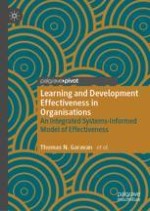This book offers an integrated and contextualised framework for learning and development (L&D) effectiveness that addresses both the nature of L&D and its antecedents and outcomes in organisations. Scholars and practitioners alike have recognised the important role that L&D plays in organisations, where the development of human capital is an essential component of individual employability, career advancement, organisational performance, and competitive advantage.
The development of employees’ knowledge, skills, and attitudes constitutes one of the most important HR challenges that organisations face. The evidence indicates that organisations continue to invest in L&D programmes as part of their HR strategy. In addition, there has been an enormous growth in research on L&D in organisations; however, there is some ambiguity concerning the effectiveness of these activities and it largely remains unclear how they can be best implemented. This book seeks to address this gap in the literature. The authors propose a framework for L&D effectiveness based on key findings from reviews, empirical research, and meta-analyses, as well as previously established theoretical frameworks within the field. Combining theory and practice, the new framework this book offers provides key guidance for L&D practitioners and researches interested in the area.
